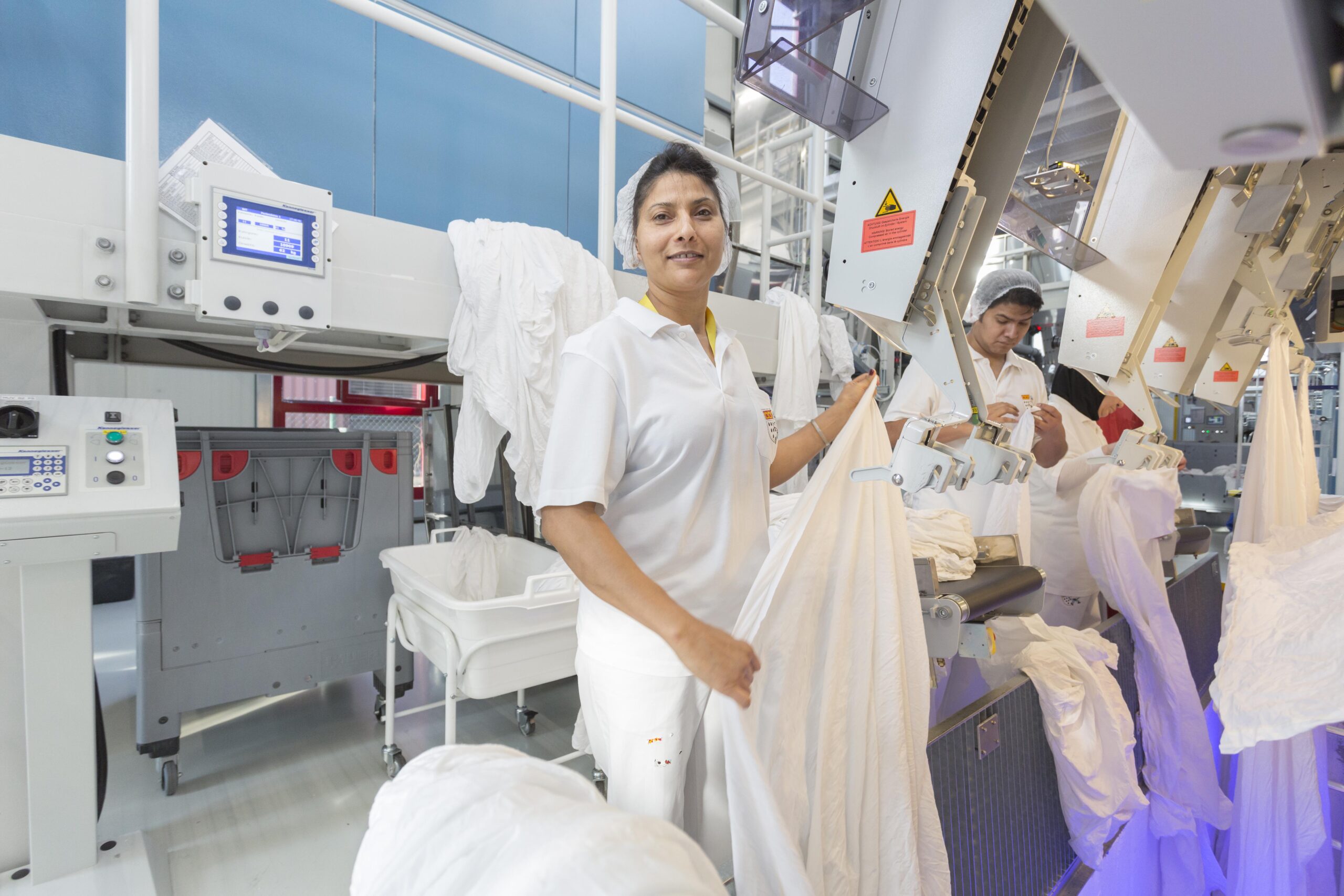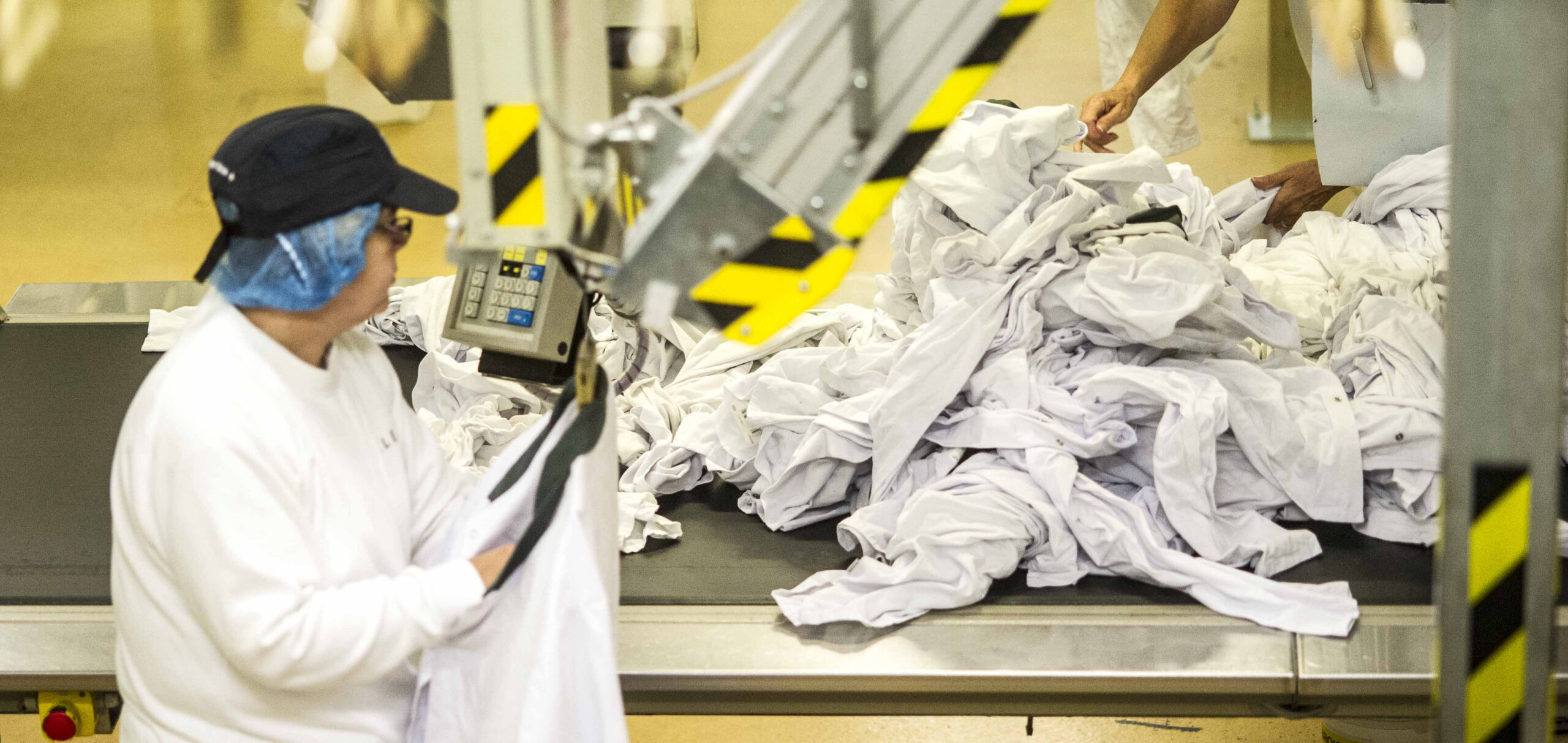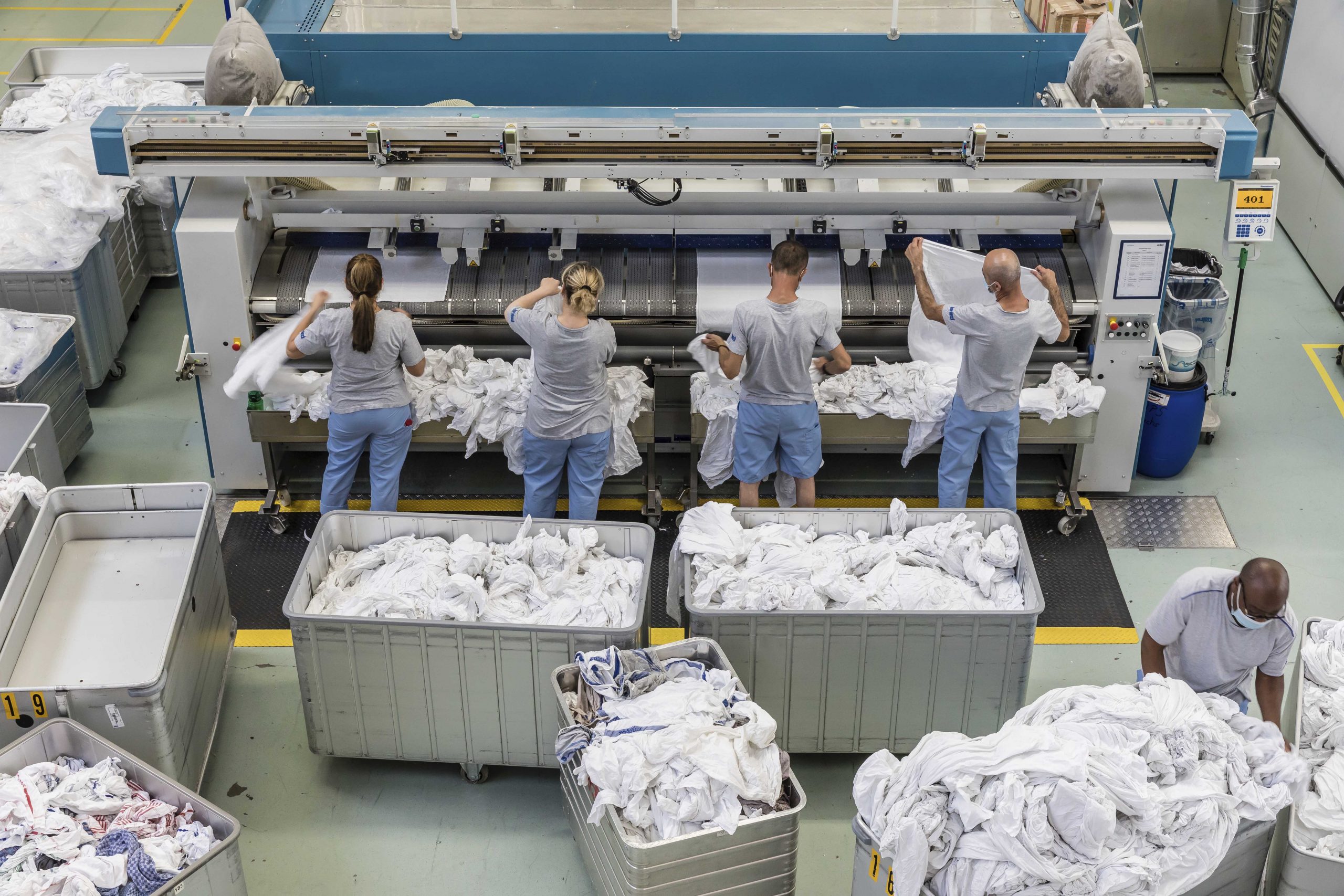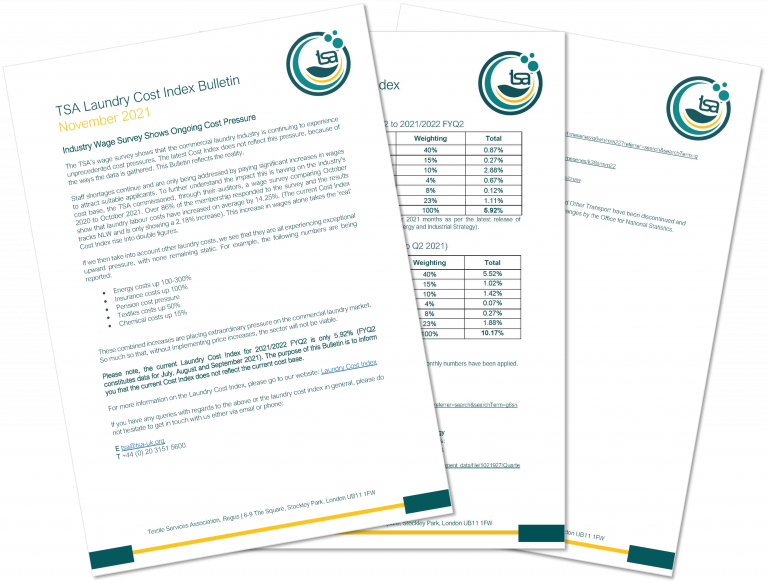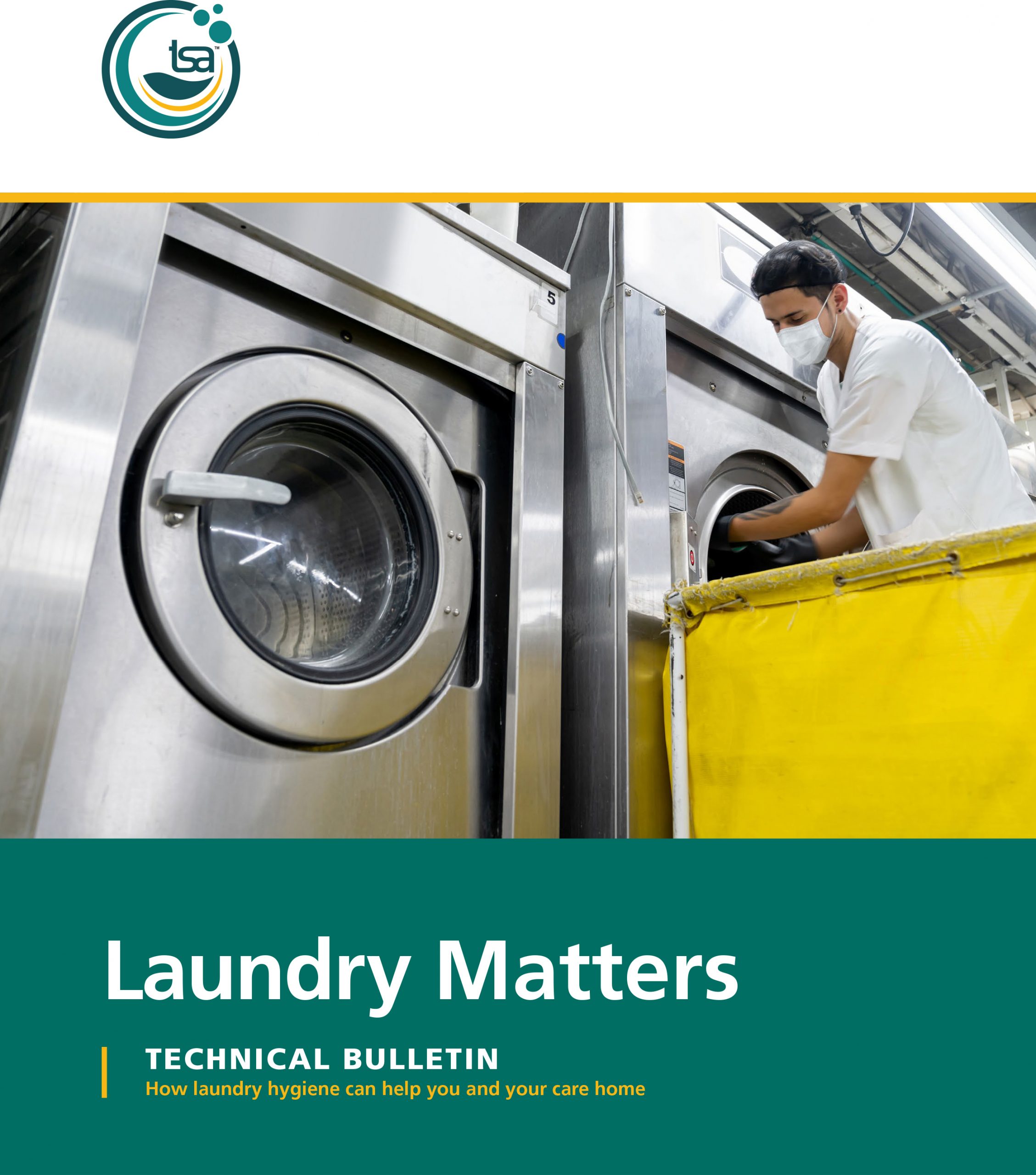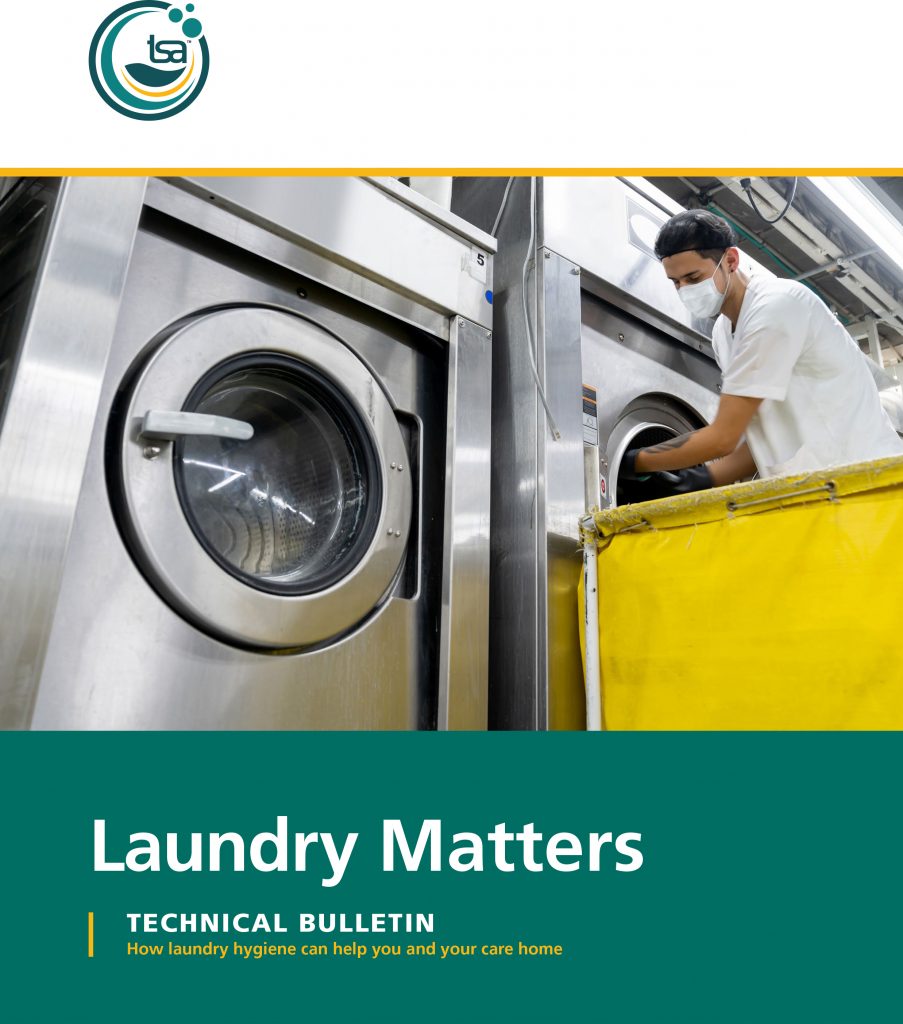Laundry Cost Index: 2021/2022 FYQ3
Laundry Cost Index
Please see our latest published Laundry Cost Index for 2021/2022 FYQ3 below. Please note, as well as the Cost Index, a TSA Laundry Cost Index Bulletin for January 2022 has also been published to sit alongside the Cost Index. This statement has been produced to highlight the unprecedent cost pressures which are not reflected in the current Cost Index. A similar bulletin was produced previously as well and can be found here.
Please see the Previous Annual Increases below for comparison:
If you have any queries or would like any further information, please do not hesitate to get in touch with us.
T: +44 (0)20 3151 5600
E: tsa@tsa-uk.org
What are commercial laundries worth to the UK?
The textile services sector sits behind practically every sector of the UK economy
Research conducted by Hatch Regeneris concludes that the textile services industry is ‘core to the operation of many businesses in vital and important sectors of the UK economy.’ It highlights three markets of particular significance, hospitality, healthcare and manufacturing, concluding that without the support of the textile services industry they would face insurmountable problems. Yet the long-term sustainability of textiles services in the UK is under considerable threat and action is needed if it is to survive.
The research was commissioned by TSA, the Textile Services Association, and was carried out in 2020. The key problems it highlighted are dramatically rising costs, downward pressure on prices and severe staff shortages. However, since then the industry has suffered even more setbacks and its position is even more precarious. “Brexit, the pandemic and escalating fuel costs have amplified the issues to a catastrophic extent,” says David Stevens, CEO of the TSA. “Without serious price rises for customers and government support – at the very least in terms of access to the EU labour market – there is a real risk that many textile services companies will go out of business.”
Textile services encompass the supply, rental, laundering and maintenance of textiles. It ranges from bedding and towelling in hotels; to PPE and workwear in factories; to surgical, pharmaceutical and high-care food workwear; to mats, roller towels and washroom services in a wide range of sectors. Each week the industry processes 53 million textile items to end users in the UK.
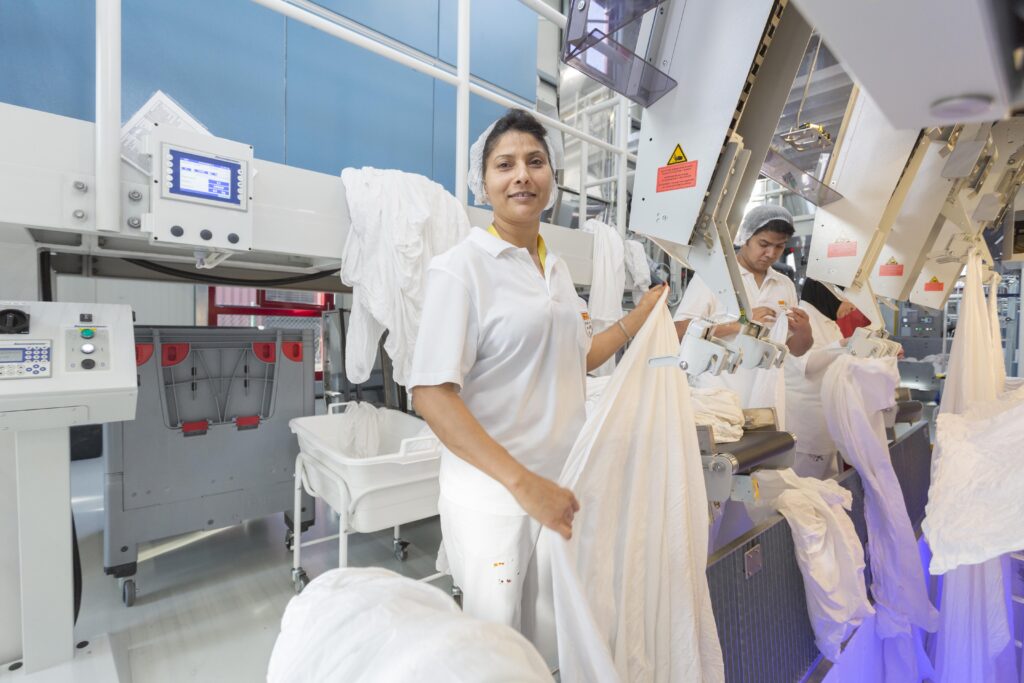
The report estimates that the textiles services industry contributes a total of £1.3billion in GVA to the UK economy and £190million to the Exchequer, while supporting 28,000 FTE jobs. It notes that hospitality is dependent on the industry, since the provision of clean, fresh linen is fundamental to their business. Just one hotel with 100 bedrooms will get through 750 pieces of linen per day. Similarly in manufacturing, the report says production lines would come to a standstill within three days of not receiving new workwear. Meanwhile, healthcare and social care can’t function safely without bedlinens, surgical gowns and patient wear washed to very high specifications.
Aside from those three key sectors, as the report points out, ‘the textiles services industry sits behind practically every sector in the UK economy.’
“If commercial textiles services ceased to operate, many UK businesses, industries and sectors would grind to a halt,” says Stevens. “We continue to press the Government for help, but so far they continue to ignore us, despite organisations like UKHospitality and NHSI supporting our arguments.”
The Hatch Regeneris research, ‘The Economic Value of the Textile Services Sector to the UK Economy,’ is available to download at tsa-uk.org, from the TSA publications section in the documents library.
If you have any queries, please do not hesitate to get in touch with us either via email or phone:
T +44 (0) 20 3151 5600
Bradford-based Christeyns grow apprentice numbers
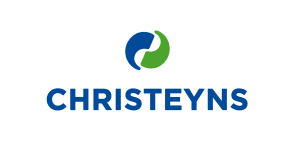
23 December 2021
Christeyns, who manufacture and supply detergents and supporting chemicals for the UK laundry sector, has recently taken on four new apprentices.
Isabel Hardwick has joined the firm as Apprentice Quality Control Technician following success in her A level examinations. Izzy’s apprenticeship will last four years and incorporates working towards a BSc (Honours) in Chemistry at Bradford University.
Danny Clarke and Tom Grundell have both taken up two-year apprenticeships as HGV Drivers. During this time, they will study to obtain an NVQ Level 2 in Supply Chain & Warehousing, as well as their LGV C+E (Class 1) Licences.
Most recently, Bradley Jones took on the role of Business Administration Apprentice, after previously working for Christeyns on a temporary contract in the Powder Production department. Bradley’s apprenticeship will run for two years and include studying for a Level 3 qualification in Business Administration.
The four new apprentices join Chemical Engineering apprentice Harry Coop, now in his second year of studying at Bradford University to achieve a BSc (Honours) in Chemistry, and Hena Arif, a QHSE Technician, who will study a Level 3 Health, Safety and Environmental qualification in 2022.
At the chemical manufacturing specialist, apprenticeships are very much a part of the business structure and play a crucial role in taking the company forward. “Our apprenticeship scheme is key for succession planning, identifying and growing talent to fill leadership and business-critical positions in the future. This helps to keep the business at the top of its game,” states HR Manager Sarah Stringer.
Providing young people with the right skills and opportunities is vital for the future prosperity of both Christeyns and the industry, and the company views its apprenticeship scheme as a crucial part of the recruitment strategy. Christeyns’ goal is to offer permanent roles to all apprentices who go through their scheme.
For further information visit:
Commercial laundries plan Sustainability Pact
Green practices will support hospitality industry’s net zero carbon objectives (additional press releases published for Industrial & Healthcare)
The Textile Services Association (TSA) is putting together a Sustainability Pact that’s designed to support commercial laundries in their drive to deliver a more sustainable future. The Pact will also support the hospitality industry’s net zero carbon objectives, but, as Shyju Skariah, technical services manager at the TSA, points out, “We just don’t want to focus on net zero carbon. We also need to be tackling water quality, reducing waste – this is so much more than a simple net zero tag.’’
The TSA has set up a Sustainability Steering Group made up of representatives from laundry operators, machinery and textiles manufacturers, and end-users, including representation from UK Hospitality. The objective for the group is to ensure that an holistic approach is taken, whether it is considering the complex end of life textiles recycling project, which will save millions of tonnes of textiles from landfill, or looking into simple measures, such as using low energy light bulbs.
“The laundry industry has already come a long way in optimising and fine-tuning its processes and operations in a more sustainable way,” says Skariah.
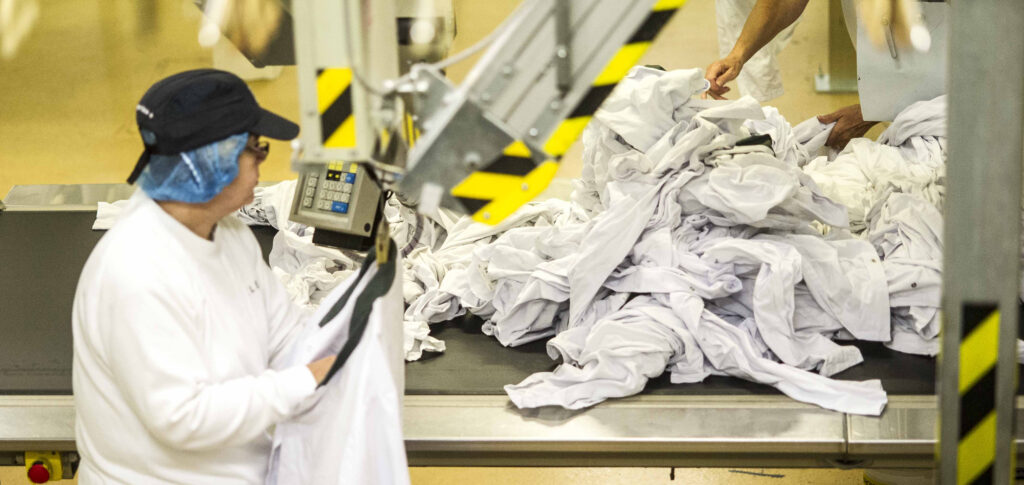
“We have seen water usage slashed, from 20 litres a kilo down to 2 litres, and energy usage halved. But we want to go much further. Nothing is off agenda with this steering group.”
The Steering Group’s first task is to set up the initial Sustainability Pact, which the laundry industry will sign up to. “We’ll run training workshops with experts so TSA members really understand what net zero means and how it can be achieved,” says Skariah. “We’ll create tools for individual companies to track progress. Each company will set their own roadmap, enabling the TSA to compile an industrywide pathway.”
The Pact will be added to as new sustainability ideas and concepts are developed, along with the practical means to initiate them.
David Stevens is CEO of the TSA. He says, “Following COP26 and with the climate change issues being addressed at a corporate level, there has never been a better time to set the most challenging sustainability objectives for the UK commercial laundry industry.”
The TSA continues to work closely with government bodies to support the delivery of the UK’s net zero carbon commitments. “We believe the laundry industry can surpass the current targets,” says Stevens. “The Sustainability Pact, and the support we are putting in place around it, will be especially useful in helping SME laundry operators achieve their green objectives.
“The Pact shows our industry is driving for a sustainable solution. It’s also a fantastic opportunity to demonstrate the benefits commercial laundries can bring to so many sectors of the economy, particularly around hospitality and healthcare.”
If you have any queries, please do not hesitate to get in touch with us either via email or phone:
T +44 (0) 20 3151 5600
Update from the TSA
TSA warns unprecedented cost increases could make commercial laundries unviable
Wages alone are up over 14%, with galloping increases elsewhere
The TSA’s wage survey of the commercial laundry sector found that labour costs have increased by a staggering 14.25% in the twelve months to October 2021. Over 86% of the TSA’s membership took part on the survey, underlining the alarm that the increases are causing throughout the industry.
The TSA (Textile Services Association) is the trade body representing commercial laundries in the UK. Its CEO David Stevens warns that, without significant price increases, the industry is simply not viable. “Wages are the tip of the iceberg,” he says. “We have reports of energy prices going up 300%, insurance up 100%, textile costs up 50%. It’s not sustainable. The industry was already reeling from the aftermath of the lockdowns and the lack of government support, but these increases are unprecedented. We’ve jumped out of the frying pan and into the fire.”
Commercial laundries service the hospitality and industrial markets, as well as healthcare including the NHS.
“The last thing we want to inflict on hospitality and healthcare is a big hike in prices, but it’s difficult to see any other options,” says Stevens.
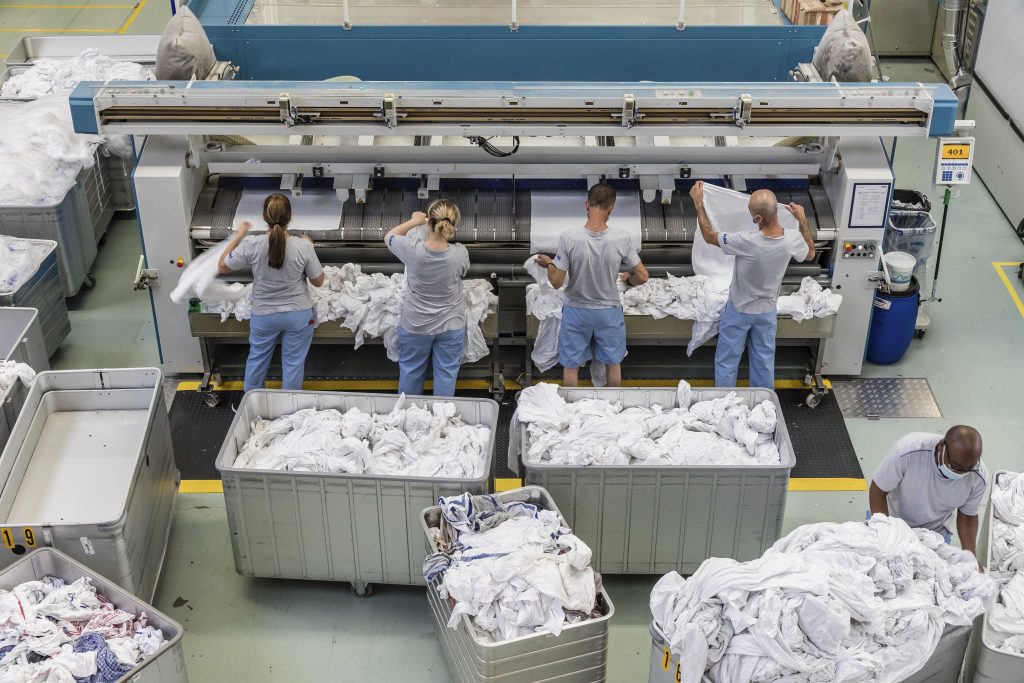
If you have any queries, please do not hesitate to get in touch with us either via email or phone:
T +44 (0) 20 3151 5600
Laundry Cost Index: 2021/2022 FYQ2
Laundry Cost Index
Please see our latest published Laundry Cost Index for 2021/2022 FYQ2 below. Please note, as well as the Cost Index, a TSA Laundry Cost Index Bulletin for November 2021 has also been published to sit alongside the Cost Index. This statement has been produced to highlight the unprecedent cost pressures which are not reflected in the current Cost Index. A similar bulletin was produced previously as well and can be found here.
Please see the Previous Annual Increases below for comparison:
If you have any queries or would like any further information, please do not hesitate to get in touch with us.
T: +44 (0)20 3151 5600
E: tsa@tsa-uk.org
Christeyns participates in Bradford Manufacturing Weeks

26 October 2021
Bradford based chemicals manufacturer Christeyns joined local and regional manufacturers for the fourth Bradford Manufacturing Weeks event aimed at introducing students to the world of manufacturing.
Launched by Bradford Chamber of Commerce and backed by the Bradford Economic Partnership, Bradford Manufacturing Weeks brings manufacturers, schools and young people together to showcase the different opportunities that a career in manufacturing can bring.
The 2021 programme ran from 4th to 15th October and during this time Christeyns was involved in a range of activities including the Apprentice Driver Awareness event at Bradford City and a Women in Manufacturing event at Bradford Grammar School.
There were various virtual webinar sessions, with Lucy Duckworth taking part in a recruitment advice panel and Liam Humphreys one of a ’task-force’ of apprentices from across Bradford taking part in the event to give students an insight into their personal experiences of the apprentice journey.
Since 2018 over 12,000 students, aged 14-18, from schools and colleges across the district have experienced the world of manufacturing. This year 32 companies were involved, offering various activities and students from 45 schools and colleges took part.
For further information visit:
TSA publishes guidance for care homes about laundry hygiene
Keeping care homes hygienic
Textile Services Association provides support for care homes looking to improve laundry hygiene
The Textile Services Association (TSA) has released guidance aimed at the care home sector to help explain how laundry helps control infections and how commercial laundries can help to raise hygiene standards.
This is part of the ongoing effort the TSA has made during the pandemic to help encourage high standards for hygiene in a number of sectors, including healthcare and hospitality. The advice is based on research carried out by De Montfort University, in association with the TSA, which was aimed at determining the survivability of coronaviruses on various fabric types and laundry processes.
This research demonstrated that while model coronaviruses can survive in water at 60°C for ten minutes, when combined with the agitation washing machines impart and detergent, no trace of the virus was found at 40°C and above. However, other pathogens like C.difficile, B.cereus, E.faecium and so on will require further thermal disinfection.
For care homes looking to maximise their hygiene, the knowledge that professional wash processes effectively eliminate the infection risk from pathogens and coronaviruses is good news. However, it was also determined that the tested strain of coronavirus can remain infectious on polyester fabric for up to 72 hours, and 100% cotton for 24 hours. It’s also possible for polyester fabric to transfer the virus to other surfaces for up to 72 hours.
With this in mind, the TSA recommends that care homes review procedures for laundry, including the
loading and unloading of washing machines and the handling and storing of soiled and clean textiles, focusing on the need to reduce the chances of cross contamination. While each care home will have its own processes, common areas to focus on include bagging soiled items, separate storage areas for soiled and clean textiles, ensuring that collection and delivery times for laundry are different, and putting in rigorous procedures for sanitising all at risk areas.
The pandemic has hugely increased the importance of maintaining the strictest hygienic standards in care homes. While some care homes may be able to implement the kind of systems required to guarantee the safety of their laundry needs, from resident’s bedsheets, clothes etc. to staff uniforms, the services offered by commercial laundries provide a simple solution to these logistical issues.
The TSA has created a technical bulletin outlining the government’s advice, as well as breaking down the kind of steps care homes should consider as part of any risk assessment they take to improve the hygiene of their laundry procedures.
As well as this, the TSA will be running an interactive webinar later in the year allowing operators to ask a panel of industry experts questions related to laundry hygiene.
The bulletin can be downloaded here.
If you have any queries, please do not hesitate to get in touch with us either via email or phone:
T +44 (0) 20 3151 5600
